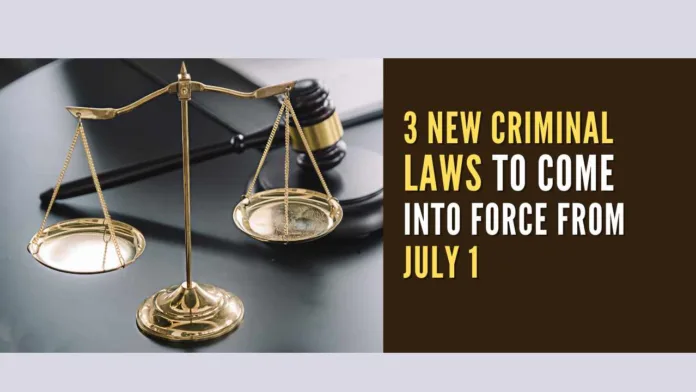
New criminal laws, replacing colonial-era codes, government confirms
On Saturday, the Ministry of Home Affairs (MHA) notified the date for the three new criminal laws — Bharatiya Nyaya Sanhita 2023, Nagarik Suraksha Sanhita 2023, and Bharatiya Sakshya Adhiniyam 2023 — and announced that these will come into force from July 1 this year.
The MHA made the announcement through three separate notifications declaring July 1 as the date on which the provisions of these acts will come into force.
As per one of the notifications issued by exercising the powers conferred by sub-section (2) of section 1 of the Bharatiya Nyaya Sanhita, 2023 (45 of 2023), the MHA declared it appoints the 1st day of July 2024 as the date on which the provisions of the Sanhita, “except the provision of sub-section (2) of section 106, shall come into force.”
They were enacted into law after they got assent from President Droupadi Murmu on December 25 last year. They will replace the Indian Evidence Act, of 1872, the Criminal Procedure Code of 1973, and the IPC.
The government, however, has decided not to implement the provision related to cases of hit-and-run by a vehicle driver as promised to truckers who had protested against it.
“In exercise of the powers conferred by sub-section (2) of section 1 of the Bharatiya Nyaya Sanhita, 2023 (45 of 2023), the Central Government hereby appoints the 1st day of July 2024 as the date on which the provisions of the said Sanhita, except the provision of sub-section (2) of section 106, shall come into force,” one of the notifications said.
After the laws were enacted, the truckers protested the provision of Section 106 (2) which provides for 10 years imprisonment and a fine to those who cause the death of any person by rash and negligent driving of a vehicle not amounting to culpable homicide, and escapes without reporting it to a police officer.
Union Home Secretary Ajay Bhalla had said the decision to invoke Section 106 (2) of the Bharatiya Nyay Sanhita will be taken only after consultation with the All India Motor Transport Congress.
For the first time, the word terrorism has been defined in the Bharatiya Nyaya Sanhita. It was absent in the IPC.
The laws have given a clear definition of terrorism, abolished sedition as a crime, and introduced a new section titled “offences against the state“.
The Bharatiya Nyaya Sanhita lists offences such as acts of secession, armed rebellion, subversive activities, separatist activities, or endangering sovereignty or unity in the new avatar of the sedition law.
According to the laws, anyone purposely or knowingly, by words, either spoken or written, or by signs, or by visible representation, or by electronic communication or by use of financial means, or otherwise, excites or attempts to excite secession or armed rebellion or subversive activities, or encourages feelings of separatist activities or endangers sovereignty or unity and integrity of India or indulges in or commits any such act shall be punished with imprisonment for life or with imprisonment which may extend to seven years and shall also be liable to fine.
Presenting the criminal bills in Rajya Sabha, Union Home Minister Amit Shah had said that laws, once implemented, will ensure the end of the ‘tareekh-pe-tareekh‘ (date of next hearing in a case) era and justice will be delivered within three years.
For all the latest updates, download PGurus App.
- Myanmar authorities seize 100 Kg methamphetamine, 13 kg of ketamine in southern region - April 28, 2024
- Centre permits export of 99,150 tonnes of onion to 6 countries - April 28, 2024
- Delhi Congress chief resigns, cites party’s alliance with AAP - April 28, 2024










